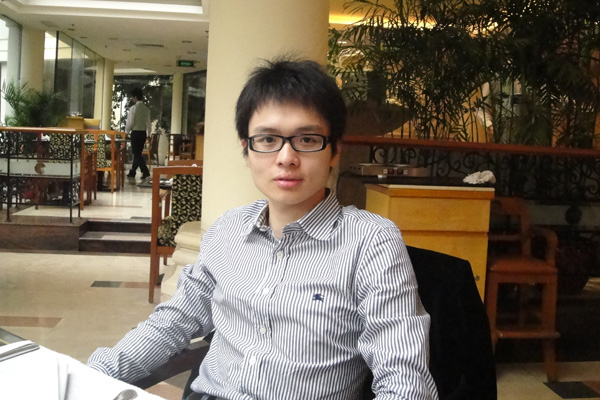


He Qian
Time:2011-12-20 10:56:34 Clicks:
Trading Your Future
by He Qian

I was enrolled into Jiangxi University of Finance and Economics in 2005, majoring in International Finance. After graduation, I continued to pursue graduate studies in University of Birmingham, and went back to Shanghai one year later with an Msc degree and an offer of working in the Treasury Trading Department, Ping An Bank Ltd, which gave me the opportunity to work as a money market trader.
As a money market trader, my duties cover credit lending, bill discount and the like. Naming it dealer or praising it trader does not matter; the key point is that money is regarded as a product whose value is measured by interest rate. We sell or buy, borrow or lend, depending on the everyday bank liquidity gap and the instant money market price. On lucky days, we could even manage to make a bundle by risk-free arbitrage if we seize the opportunity. However, as returns always come with potential risks, the job requires rigorous discipline and prudence. Our daily transactions will be strictly controlled within the risk exposure process, and by following those trading processes formulated by fancy mathematics and banking rules, risks can be effectively lowered down.
The following is one of my typical working days. You can see how it goes:
8:30 am
Arriving at the office, I often enjoy my “self-made coffee time”, turning on the computers and getting everything in preparation, such as praying.
9:00-11:00
Step 1.Keeping a close eye on the China inter-bank currency trading system, paying attention to the money demand and supply through collateral repo, and then forming our own expectations.
Step 2.Searching the information and quote in China cp (?), calculating the weighted average interest rate respectively.
Step 3.Making inquiries to various types of banks, including state-owned banks, Shareholding commercial banks, municipal commercial banks, rural commercial banks etc.
Step 4.Taking comprehensive considerations and evaluating the internal fundamental transfer pricing level by combining the Internet quote price and the phone-call asked price. Giving the first bid.
11:30
Paying attention to Shibor, and keeping the first offer or changing the bid according to the previous half hour’s feedback.
After a short lunch break, we can probably decide whether we have transactions today. If not, we usually collect other banks’ annual financial reports, which will be used to evaluate their credit quota.
About 16:00 pm, we start to write transaction log and send e-mails to Treasury Department. We can leave the seat at 17:00 when People’s Bank of China closes the large-value payment system. I often stay one more hour to record what happened in today’s financial market, not only money market, but also capital market, FX market, bonds, options etc. Based on the basic analysis, I can draw my own chart weekly. In this way I can have deeper insight into the whole financial market and it helps making more thorough analysis and better predictions.
When referring to jobs in banks, people will always be reminded of bank tellers or custom managers and so on. In comparison, traders are less known to the public, except that they are forever wearing suit and tie, busy making transaction in front of a row of computers, and flying from time to time across different regions for business trips with five star hotel settling. Therefore I hope through my introduction, the veil of traders, at least in the money market, can be partly revealed. As a matter of fact, a huge amount of profit in banks is created by the financial transactions of this kind rather than just deposit and credit, but. That is also why I find my job quite exciting. Whereas traders would in return bare more pressure and have less leisure time to spend with family, compared with other positions.
My suggestion to you for your career development is that you should try to obtain the banking qualification certificate while you are still studying in JUFE, if you want to know about what the responsibilities are for the bank staff. The certificate cannot ensure you a job, but it can help you to find out your interest and increase the opportunity to find you a proper job. After gradation or in the further education, CFA can be your next goal. At last, if you want to be a trader as well, you should be a trader certificate holder.
